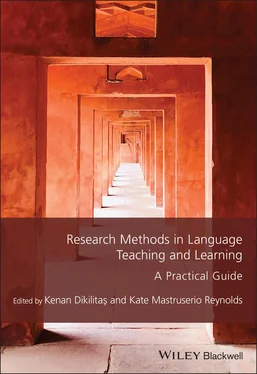Research Methods in Language Teaching and Learning
Здесь есть возможность читать онлайн «Research Methods in Language Teaching and Learning» — ознакомительный отрывок электронной книги совершенно бесплатно, а после прочтения отрывка купить полную версию. В некоторых случаях можно слушать аудио, скачать через торрент в формате fb2 и присутствует краткое содержание. Жанр: unrecognised, на английском языке. Описание произведения, (предисловие) а так же отзывы посетителей доступны на портале библиотеки ЛибКат.
- Название:Research Methods in Language Teaching and Learning
- Автор:
- Жанр:
- Год:неизвестен
- ISBN:нет данных
- Рейтинг книги:5 / 5. Голосов: 1
-
Избранное:Добавить в избранное
- Отзывы:
-
Ваша оценка:
- 100
- 1
- 2
- 3
- 4
- 5
Research Methods in Language Teaching and Learning: краткое содержание, описание и аннотация
Предлагаем к чтению аннотацию, описание, краткое содержание или предисловие (зависит от того, что написал сам автор книги «Research Methods in Language Teaching and Learning»). Если вы не нашли необходимую информацию о книге — напишите в комментариях, мы постараемся отыскать её.
Research Methods in Language Teaching and Learning
Research Methods in Language Teaching and Learning
Research Methods in Language Teaching and Learning — читать онлайн ознакомительный отрывок
Ниже представлен текст книги, разбитый по страницам. Система сохранения места последней прочитанной страницы, позволяет с удобством читать онлайн бесплатно книгу «Research Methods in Language Teaching and Learning», без необходимости каждый раз заново искать на чём Вы остановились. Поставьте закладку, и сможете в любой момент перейти на страницу, на которой закончили чтение.
Интервал:
Закладка:
Data Analysis
In this research, different types of data were collected with varied purposes. This necessitated implementing different methods for data analysis. The quantitative data were collected through closed-ended items included in initial, post-session and final student questionnaires. Descriptive statistics were used to analyze items, which aimed to reveal general tendencies of the participants (e.g., the usefulness and the effectiveness of activities) and the Wilcoxon signed-rank test was used to explore possible changes in participants’ responses to the same items in initial and final questionnaire (e.g., satisfaction with speaking ability, perceived engagement in speaking activities).
Qualitative data were collected with four different purposes: (a) describing classroom procedure, (b) identifying general tendencies, (c) understanding different cases, and (d) generating a theory. The differing purposes made it necessary to find the right data analysis for each purpose. The first objective was addressed through observations. I referred to chronologies of classroom events to analyze my field notes of observations. As proposed by Patton (1980), I identified key events in the classroom procedure by focusing on the interviewees. The second objective was addressed through open-ended items included in student initial, postsession, and final questionnaires. Qualitative content analysis of the data was implemented, as this enabled me to identify schema of categories and compare different cases (Flick, 2006). I used inductive coding, in which the categories emerged from the data rather than the literature or theory (Burns, 2010a). To do this, I read the data several times, coded and categorized these, and then listed them in descending order to reveal the most commonly recurring themes. The third objective was concerned with understanding the interviewees. I analyzed teacher and student interviews using case analysis, focusing on each person individually (Patton, 1980). I was not interested in finding out the differences and similarities among the interviewees, but rather to understand how each interviewee’s responses differed throughout the study. To do this, I conducted qualitative content analysis and compared their responses to earlier interviews. The final qualitative data was collected in Stage 3. This stage aimed to develop a new understanding of the situation through exploring the impacts of student-negotiated speaking classes on issues that were relevant to the scope of this research.
As can be seen in Table 3.1, three main constructs seemed to hinder participants’ satisfactions with their speaking ability: being not fluent, lack of practice opportunities, and anxiety. These emerged as important issues that we needed to take into account in designing speaking activities.
Table 3.1 shows a sample analysis of the data collected in student initial questionnaire. The open-ended item asked participants to comment on their satisfactions with their speaking ability.
| Respondent | Comment | Coding |
|---|---|---|
| 1. | Although I can in some degree express the opinion that I formed in my mind, I don’t think I can speak effectively and fluently. | Not fluent |
| 2. | No matter how much we want, we cannot speak fluently. In fact, we can speak but we get stuck, I guess. | Not fluent |
| 3. | I can easily understand spoken English. But I cannot respond immediately when I speak. This is because of lack of practice and lexical knowledge. | Lack of practice Lack of lexical knowledge |
| 4. | I am not happy with my speaking performance and I feel incompetent. The reasons are lack of self-confidence, feeling shy and other weaknesses. | Anxiety |
| 5. | I think so long when I want to express something. | Not fluent |
| 6. | I feel very excited before I start speaking. I forget all words. | Anxiety |
| 7. | I think my speaking is at middle level. Speaking is only covered in lessons for one year. | Lack of practice |
| 8. | I am not very happy because there is not adequate opportunity for speaking. | Lack of practice |
| 9. | I cannot speak well and am not fluent enough. I cannot narrate things I know. | Not fluent |
| 10. | I am very dissatisfied. Because when I start speaking English, I get nervous and I cannot get focused and explain what I think. | Anxiety |
All of the analyses were implemented with the purpose of generating a new theory about the possible outcomes of student-negotiated speaking classes. To do so, we scrutinized our interpretation of the data collected throughout the study. Table 3.2shows how each data source contributed to developing the theory.
Table 3.2 Sources of findings related to developing a theory
| Research Stage | Data collection method | Major findings |
|---|---|---|
| Stage 1 | Observations | Students did not talk a lot Students were not interested |
| Initial questionnaire Qualitative data | Lack of practice Limited lexical knowledge Lack of fluency Anxiety | |
| Initial questionnaire Quantitative data | Lack of practice Limited lexical range Lack of fluency Anxiety | |
| Stage 3 | Final questionnaire | Prioritized their wants and needs Provided opportunities Fostered fluency Prompted their motivation to be engaged in activities Increased their positive attitudes towards speaking classes Fostered their perceived speaking competence Increased their willingness to communicate Increased their self-esteem |
As displayed in Table 3.2, observation and questionnaire data revealed several problems that participants encountered in the class. These findings informed the designs of our research interventions in Stage 2. We developed the theory based on the findings of the final questionnaire, which revealed positive outcomes of student-negotiated speaking classes. These data led to developing an assumption regarding the role of student negotiation in EFL speaking classes, which was that it increases student engagement in speaking activities by means of fostering positive affective states such as motivation, perceived speaking competence, perceived speaking fluency, willingness to communicate and self-esteem. This hypothesis was the outcome of grounded theory.
Moving Towards Implementing Grounded Theory
In qualitative research studies, the subjective involvement of researchers is acknowledged, because they are seen as a natural part of research. They make important decisions and interpretations throughout the research and these are inevitably informed by their subjective viewpoints. This is considered to be a strength of qualitative research. However, with regard to data analysis, relying on researchers’ subjective intuition is questionable, because this might lead to making wrong interpretations. Miles and Huberman (1994) do not consider this to be a strength of qualitative research and assert that qualitative data analysis should be systematic and methodology-driven.
One of the significant methodologies for qualitative research is grounded theory. Strauss and Corbin (1998) describe grounded theory as a “general methodology for developing theory that is grounded in data systematically gathered and analyzed” (p. 158). It proposes carefully planned steps of developing a theory (Crotty, 1998), and hence, it is “a systematic process of developing a theoretical hypothesis from descriptive data” (Perry, 2005, p. 75).
Читать дальшеИнтервал:
Закладка:
Похожие книги на «Research Methods in Language Teaching and Learning»
Представляем Вашему вниманию похожие книги на «Research Methods in Language Teaching and Learning» списком для выбора. Мы отобрали схожую по названию и смыслу литературу в надежде предоставить читателям больше вариантов отыскать новые, интересные, ещё непрочитанные произведения.
Обсуждение, отзывы о книге «Research Methods in Language Teaching and Learning» и просто собственные мнения читателей. Оставьте ваши комментарии, напишите, что Вы думаете о произведении, его смысле или главных героях. Укажите что конкретно понравилось, а что нет, и почему Вы так считаете.












